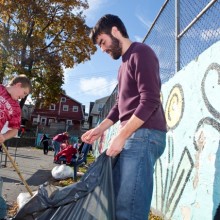After he graduates, Chris Kelly ’13 (Boyertown, Pa.) plans to work in the field of environmental politics. A double major in geology and international affairs, Kelly is learning and using many of the skills he will need in a real-world environment through the College’s Technology Clinic.
“I bring a lot of passion to this project because this is what I want to do with my life,” says Kelly.
The project is looking at how to make the golf cart industry more environmentally friendly through solar and hydrogen power, and possibly using the technology as a business redevelopment tool to be adopted in economically distressed areas. The Lafayette team is partnered with Air Products and Chemicals in Allentown and the Slate Belt Council of Governments, and the project requires expertise in biology, chemistry, economics, engineering, and public relations.
Biology major Claire Brown ’12 is excited about the project’s multidisciplinary nature.

Lafayette students and Easton residents spruce up Raspberry Park.
“I’ve never worked with such a diverse group of students before. We have done a great job of bringing different perspectives and working together,” says Brown. “Tech Clinic is a completely different experience than a normal class. It’s really about meeting our expectations and the potential that the solution we come up with can have a real impact.”
Tech Clinic is a hands-on course founded in 1987 that brings together students from different majors to help solve real-world problems of a business, nonprofit organization, or government body. The clinic runs two separate projects each year with different teams made up of 6-7 students each representing all four of the College’s academic divisions.
Students in Tech Clinic are nominated by professors and selected based not only on academic talent, but also for being well rounded and able to think outside the box.
“Tech Clinic is a strong example of experiential learning, and it reflects what goes on in the real world once you leave academia,” says Larry Malinconico, associate professor of geology and environmental geosciences and Tech Clinic director. “Our projects don’t just require simple mechanical solutions, but are significant intellectual challenges that will produce practical solutions or recommendations.”
According to Dan Bauer, professor emeritus of anthropology and sociology and founder of Tech Clinic, the first project back in 1988 came together as one of the purest examples of what the class is all about. A law had been enacted requiring tree branches and other debris that collects along dams to be removed for river navigational purposes. The Safe Harbor Water Power Corporation, which runs a hydroelectric generating plant on the Susquehanna River, was in need of an efficient and cost-effective way to accomplish the debris removal.
The Tech Clinic stepped in and took on a very complex project that required the navigation of numerous legal, political, social, and technical barriers. The team came up with the specifications for the first large-scale propelled debris harvester, which is now manufactured and used worldwide.
Since then, there have been 49 Tech Clinic projects running the full gamut of issues including development of a flood museum, a drunk-driving simulator, a greener Lafayette campus, tracking the causes of low-birth weight babies, sleep disorders, and waste management.
This year’s other project, which just concluded, examined environmentally friendly ways to revitalize the West Ward neighborhood in Easton. Working with the West Ward Neighborhood Partnership and the Community Action Committee of the Lehigh Valley, the project considered many ways to strengthen the local community. The team held a community gathering to spruce up the neighborhood in and around Raspberry Park and recommended the installation of an urban exercise trail with loops themed after different activities such as community gardening and community art.
The project allowed Hannah Klein ’11 (Wilmington, Del.), a math-economics major, to intertwine her academic and community service work. Through the College’s Landis Community Outreach Center, Klein volunteers for Best Buddies and the Kids in the Community program and tutors students at a local middle school.
“Tech Clinic allowed me to use my economic and urban development work and see how I can apply it to a neighborhood like the West Ward,” she says.
James Maloney (Wallingford, Pa.), a government and law major, says Tech Clinic gave him a look at what the work world might be like.
“I wanted a small-team experience with a little bit of structure,” he says. “Tech Clinic seems just like a real job. Your boss comes in and says, ‘I need a few ideas for how we can fix this by Friday,’ and you sit down and figure out how to do it.”
